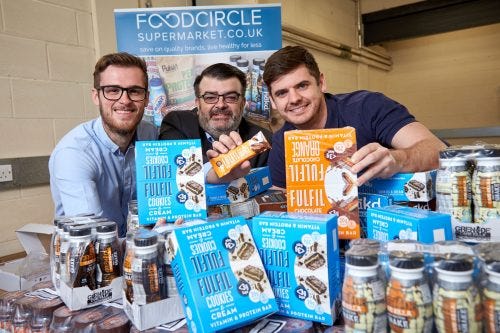Right place, right time, right fit
Making mergers work, and the story behind Huddled PLC
One of the very first things I was ever briefed on as a journalist covering mergers and corporate activity, back in the 1990s, was the description of an American conglomerate as a “blob”.
The feeling was this sprawling electronics group had become too big, lacked focus and was being out flanked by nimble rivals.
I always have that in mind when I see buy-side, and sell-side comments about whether businesses will fit.
This week has seen a bit of this.
Is AIM-listed Huddled Group plc the right home for Sheffield-based retailer Food Circle Supermarket, which has been bought for £300,000?
The founders Paul Simpson and James Barthorpe are staying on with the business they founded in 2018 and have built into a decent online, direct-to-consumer retailer specialising in discounted foods for healthy and specialised diets such as high-protein and energy products. It delivers around 3,000 orders per month, with an average order value of about £40.
Food Circle, which sells discounted and short-dated stock, has seen (unaudited) revenue of £1.4m and made a small net loss of £46,000 for the year ended 31 December 2023.
Martin Higginson, chief executive of Huddled, who was a few years above me at school (irrelevant point) says it “can be grown significantly”.
More importantly, he thinks Huddled will benefit from Food Circle which will strengthen their position in the online surplus food and drink market, alongside an existing Huddled brand, Discount Dragon, which used to be known by the slightly odd name Yankee Bundles.
He says Food Circle is complementary to the Discount Dragon business and is “the next step in the Group's strategy to build a portfolio of e-commerce brands”.
As recently as October 2023 Huddled was known as Let's Explore Group PLC, which only took its present form after selling a location based virtual reality entertainment business for $25m, when it was known as Immotion Group.
Since then Leigh-based Discount Dragon for which it paid £3.45m, with a deferred payment of £500,000 in April 2025, is its core trading business, and the market update in January reported it was doing well with quarterly sales up to £1.8m from £1.3m.
But the sale of Vodiac virtual reality headsets sold via TV shopping channels, including QVC in the UK and USA, TSC in Canada and TVSN in Australia, doesn’t immediately look complementary.
Food Circle, on the other hand, small as it is, could well be the catalyst that gives the whole of the Huddled Group a firmer identity as an ecommerce retailer.
::
:
Much more precise and clear to understand was the deal to buy Varley Castors of Altrincham by Wiltshire-based BIL Group, which is backed by Daresbury-based investor PHD Industrial Holdings.
It’s also the first example of an acquisition by one of PHD’s portfolio companies, under their ownership. I’ll hopefully be able to drill into the details of this next week when I get a download from Peter Horton at PHD who did the deal.
The acquisition is the first by BIL and was backed by a £4.5m finance package from Arbuthnot Commercial Asset Based Lending which also includes funding for further growth and acquisitions.
Varley, a third-generation family business founded in 1938, employs 16 staff in Altrincham and its branch in Shropshire and supplies original equipment manufacturers and resellers nationwide.
The amount hasn’t been disclosed, but the deal will allow for the eventual retirement of Andrew Spring and Tim Batten, who will remain in their role as joint Managing Directors and continue to lead its growth with the support of the BIL and PHD teams.
Andrew Spring said: “Joining forces with BIL brings together two like minded companies with shared values and a combined trading history of over 130 years. The alliance will provide long term benefits for our clients. We look forward to working with BIL to enable both businesses to take advantage of the opportunities ahead.”
Timothy Murrow, Managing Director of BIL, said: “This first acquisition is a pivotal moment for BIL and is part of our long term growth strategy, which is fully supported by PHD.
“Currently both businesses supply different products and serve different customers. The deal will broaden our product range and give Varley access to our extensive range of materials handling equipment, which will open up new sales channels for both sides.”
PHD Industrial Holdings, which is based in Daresbury, operates a ‘corporate compounder’ model which, unlike private equity, enables it to invest for long term growth without having to sell businesses every few years to return funds to investors.
BIL Group is one of six trading businesses in its portfolio which between them have a combined turnover of more than £60m.
::
::
Also on my radar this week was the £3m fundraising by Praetura of a VCT fund (Venture Capital Trust). I have absolutely no doubt that raising any money in the present climate is tough, and they have done well to get it over the line from a standing start.
The VCT market has been especially challenging this year following the increases to pension allowances.
I had a look through the prospectus and £3m was always the minimum they stated the trust would raise, and £1m was already committed by their board.
As Sam McArthur, who joined Praetura Investments to do this project, said, it’s extremely rare for a new VCT to launch, but after 13 years of investing through EIS-qualifying structures, a Praetura Growth VCT was “largely driven by demand from financial advisers” looking to access the kinds of businesses Praetura backs.
It’s a start, and more could flow by the end of May, but it’s tough out there.
::
This week subscribers to the Rainmakers will have received two deep dive pieces.
On Tuesday we took a closer look at some of the trends in the ever changing corporate finance advisory market.
We spoke to Tom Jack who is leaving private equity fund Endless and is due to start a senior role at Alvarez & Marsal and James Edge about his leadership of a buyout of Convex Capital from the listed professional services entity RBG plc. The buyout has been backed by Knights plc, but Convex is to be run separately.
Yesterday, we did a deeper dive into the background to the parallel process to restructure, and potentially sell off, Revolution Bars, including a few observations about the key players in that deal, Luke Johnson and Keith Edelman.
::
Here’s now this is going to work going forward.
There will be a longish read piece on Tuesday and Thursday, for subscribers only.
Typically, one will focus on happenings going on in the advisory and funding market - what it means and where things are going.
The other will look at deals from a market perspective. How much was paid? what the vendor wants, who the management team are, an interview with a CEO on the buy or sell side.
On Friday, free to everyone, we’ll pull out a few of the completed deals from that week and look under the hood a bit more. I might even have an educated guess at some of the prices paid on all of the undisclosed deals we get to hear about.
::
Thank you for subscribing to Rainmakers.
We believe in good journalism that is worthy of your support. Please share this edition of Rainmakers so we can grow the message further and wider.
The insights and commentary we share with you are rooted in the trust we have built in the business community.
If you have something you think we should look at, then either reply to this newsletter or email michael.taylor@thebusinessdesk.com.









